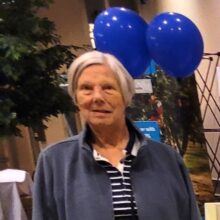By Linda Thomas
I just got back from MyoCon25, and honestly? I’m still recovering—in a good way. For those of us living with a rare disease like inclusion body myositis (IBM), this kind of conference is more than just PowerPoints and name tags. It’s a lifeline. A chance to be with people who get it without needing a long explanation, and to hear from experts who actually know what they’re talking about.
The first thing that struck me was how valuable the breakout sessions were this year. They weren’t just “talk at you” presentations—they were real conversations. Practical tips on adaptive exercise, nutrition tailored to inflammatory myopathies, and how to navigate daily life when your body no longer cooperates like it used to. There was one especially helpful session about assistive devices—not just what to use, but how to mentally and emotionally adjust to needing them. Another session touched on caregiver relationships, which hit close to home for many of us. It wasn’t all serious either—there were laughs, some gentle teasing, and even some hallway scooter races (we’re not naming names).
The keynote speaker set the tone from the start: former Representative Steve Bartlett who co-sponsored the original ADA legislation. Hearing directly from someone who helped shape the laws that protect our rights reminded us that advocacy isn’t optional—it’s survival.
And the closing speaker, Dr. Julius Birnbaum, gave us a gift with his talk Living Well with Autoimmune Diseases. He brought clarity, empathy, and just the right dose of humor. His message—and his book of the same title—wasn’t sugar-coated or unrealistic. Instead, it offered hope that felt grounded. Yes, our diagnosis may rewrite parts of the script, but the story itself is far from over.
And then there were the people. My people. The ones who know what it’s like to drop your fork because your grip gave out, or to stare at a staircase like it’s Mount Everest. We swapped tips, emails, and stories—some heartbreaking, some hilarious—and formed bonds that go beyond the conference badge. It’s a strange kind of comfort, finding yourself in a crowd of people with the same rare thing.
The real cherry on top was hearing from the doctors and researchers leading the charge. These weren’t fly-by-night internet experts—they’re the ones in the trenches, studying this disease from every angle. They shared updates on ongoing clinical trials, new diagnostic approaches, and the latest thinking on what actually causes IBM. And they did it in plain English, without making us feel like we needed a medical degree to keep up.
So yes, I came home tired. But also encouraged. Seen. Reminded that even though this disease is rare, I am not alone—and neither are you. MyoCon 2025 gave us knowledge, support, and community. And that’s more powerful than anything you’ll find in a textbook.
Linda Thomas was diagnosed with IBM in 2023. Her disease has progressed slowly so far. She journals about her journey in a blog at ibmwarrior.com and has written three books on self improvement. After several jobs in leadership positions, she failed retirement three times but is now getting the hang of it.

My first time attending the conference and you captured the entire 3 days beautifully! Thank you Linda!
Enjoyed your article. My husband has IBM.
Thank you Linda
This was my first meeting. I hope to attend next year‘s my myocon in St. Louis, Missouri. I loved the term you used “my people “ because I said those exact words to my family when I came home. Until then I had met no one with IBM now I know lots of people with the dreaded Myositis diseases.